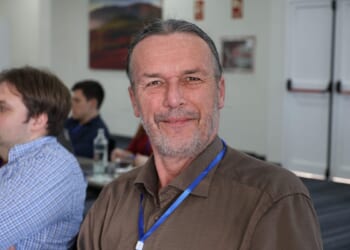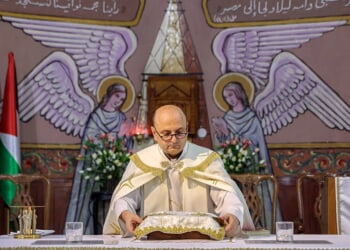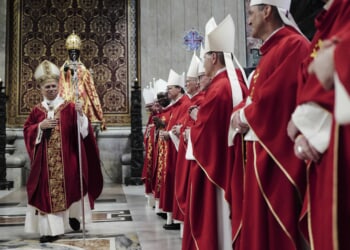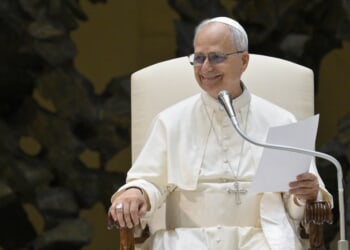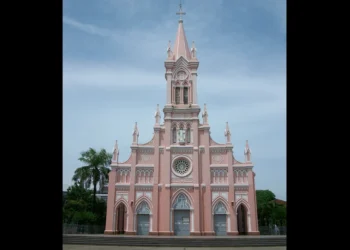Washington, D.C. Newsroom, Jul 11, 2025 /
13:15 pm
As the Trump administration grapples with potentially conflicting immigration enforcement and economic policy goals affecting the agricultural sector, Bishop Brendan Cahill of Victoria, Texas is raising his voice on behalf of the country’s migrant farm workers.
The plight of migrant workers “should be one of great concern to all Catholics, and we should be committed to recognizing the importance of their work and to upholding their God-given dignity,” Cahill, chairman of the USCCB’s Subcommittee on Pastoral Care of Migrants, Refugees, and Travelers, told CNA.
Cahill is set to become chairman of the USCCB’s Committee on Migration at the end of this November’s plenary session.
“Undocumented farmworkers labor tirelessly in American fields, orchards, and other settings, playing a key role in our food supply chain,” he continued. “They ensure there is food on our tables, often while enduring harsh conditions, isolation, and exploitation in their line of work.”
The bishop emphasized that Catholics “are called to accompany [migrant farmers] as we simultaneously advocate for reforms to our immigration system that benefit both our economy and all those who labor within it.”
Both President Donald Trump and Agriculture Secretary Brooke Rollins said in separate statements this week that the administration would not be granting “amnesty” to migrant farm workers, but the president has also indicated several times that his administration plans to grant a “temporary pass” for certain laborers in the country illegally.
According to data from the Kaiser Family Foundation, 47% of U.S. agricultural workers are unauthorized immigrants.
The bishop’s comments come after Rollins specifically stated on July 8 that “there will be no amnesty” for migrant farm workers in the U.S. illegally.
“Mass deportations will continue, but in a strategic way,” Rollins said. “Ultimately, the answer on this is automation, also some reform within the current governing structure,” she said, referring to current visa programs for farm workers.
At a July 3 rally in Iowa, Trump said that he and Homeland Security Secretary Kristi Noem planned to “sort of put the farmers in charge” of migrant labor in the agricultural sector.
“Now, serious radical right people, who I also happen to like a lot, they may not be quite as happy but they’ll understand,” Trump said.
“If a farmer’s willing to vouch for these people,” the president said of migrant workers in the country without legal status, “Kristi, I think we’re going to have to just say that’s going to be good, right?” he continued, “because we don’t want to do it where we take all of the workers off the farms.”
At a cabinet meeting this week, Trump also echoed Rollins, saying: “We’ve got to give the farmers the people they need, but we’re not talking amnesty.”
Trump insisted that “what we’re doing is getting rid of criminals” and hinted at the administration’s plans to improve the existing H2 visa programs, which allow employers to bring foreign nationals to the U.S to fill certain jobs in agriculture and hospitality, among other sectors.
At the same meeting, Labor Secretary Lori Chavez-DeRemer said her department is spearheading those efforts.
In an interview earlier this year, Rollins had indicated that once the border has been “locked down” and the country has “real border security” then “I think we can begin to pivot into ‘How do we fix this for the long term?, what does the labor look like and how do we ensure our farmers have what they need to do what they need to do?’”
(Story continues below)
Subscribe to our daily newsletter
“You can’t even begin to talk about real reform in your immigration system until you have locked the border down and you have real border security,” Rollins said.
Bishop Frank Dewane of Venice, Florida is also among the prelates who have spoken out against mass, indiscriminate deportations.
Dewane said President Trump’s recent remarks on farmworkers reflect what the bishop called “a growing recognition that many, indeed most immigrants, even those who are not lawfully present, are not dangerous but peaceful, law-abiding, and hardworking contributors to our communities and to our economy.”
The Florida bishop called for “serious reforms” of the country’s immigration system that “preserve safety and the integrity of our borders, as well as to accommodate needs for labor” and family stability.
Dewane’s statement included a link to the U.S. Conference of Catholic Bishops’ statement earlier this year that calls for enforcement measures to “focus on those who present genuine risks and dangers to society, particularly efforts to reduce gang activity, stem the flow of drugs, and end human trafficking” while calling for the provision of “legal processes for longtime residents and other undocumented immigrants to regularize their status.”







